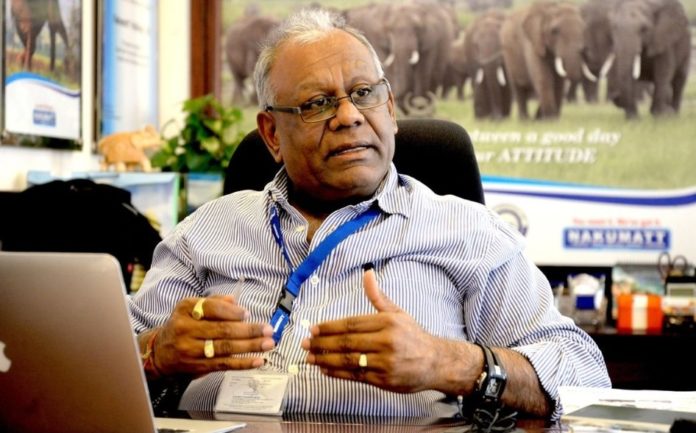Atul Shah, ex-chief executive officer of Nakumatt, has lost his Lavington home to auctioneers after the High Court rejected a petition seeking to reverse KCB Group’s forced selling of the high-end property over a Sh2 billion debt.
The petition filed by the administrator of the defunct supermarket chain was rejected by Justice Francis Tuiyott, who said it had no chance of succeeding.
Nakumatt’s court-appointed administrator had objected to the sale, claiming that the auction had broken the law, and had named Mr Shah as a potential defendant.
Early this year, the bank quietly sold the house, which Mr Shah had used as additional security as Nakumatt’s guarantor to provide comfort to the multiple bank loans, via Leakey Auctioneers.
“This court is not convinced that the suit, as it stands now, establishes a prima facie case with a fair chance of success. “Because this court has been unable to overcome the obstacle, it is unnecessary for this court to consider the other issues posed in the application,” the judge said.
According to court records, KCB had previously sold Mr Shah’s prime property in Nairobi’s Industrial Area to Furniture Palace International Ltd for Sh1.04 billion.
Nakumatt, which expanded from a mattress shop in a rural town to have locations across Kenya and East Africa, was forced to close last year due to a lack of funds to pay suppliers, tenants, and other creditors.
Banks owed billions of shillings by the bankrupt retailer are vying for Mr Shah’s personal property in order to recoup their losses.
While the banks lent Nakumatt billions of shillings based on the retail chain’s cash flow, Mr Shah put his personal assets up as collateral to ensure that the credit was disbursed quickly.
In 2011, the Lavington home was provided as collateral for the multi-billion shilling loans, and it was valued at Sh25 million.
The sale of the personal property is a new low for Mr Shah, who has been the regional retail business’s corner office for decades.
As a result, global institutions such as the Financial Times named the former Nakumatt CEO one of the world’s top 50 influential businessmen, alongside Equity Bank’s James Mwangi and Nigeria’s leading industrialist Aliko Dangote.
Following the demise of the Nakumatt empire, the 59-year-old entrepreneur has remained in the shadows, never saying a word in response to the relentless media coverage of the company’s woes.
Justice Tuiyott questioned why the court-appointed administrator, Peter Kahi, was fighting to overturn the auction rather than Mr Shah.
“No good reason has been demonstrated why matters truly belonging to his corner (Mr Shah) must be urged by the principal debtor without his participation as a substantive party,” the judge stated.
Mr Shah was named as a potential interested party in Mr Kahi’s lawsuit.
The administrator contended that KCB had not served Mr Shah with the auction notice, disputed the loan computation, and maintained that the Lavington home was not used as collateral for the bank loans.
Nakumatt filed for bankruptcy in January, with debts totaling Sh30 billion, including Sh18 billion owed to suppliers, Sh4 billion owed to commercial paper holders, and the remainder owed to banks, which have become more aggressive in pursuing unpaid loans.
Nakumatt owed DTB Bank Sh3.6 billion, Standard Chartered Sh900 million, KCB Sh1.9 billion, Bank of Africa Sh328 million, UBA Sh126 million, and GT Bank Sh104 million, according to regulatory filings.
Mr Shah claims in court archives that a few moneylenders offered Nakumatt credits with an eye toward his properties, and that the banks were reluctant to help the organization’s salvage plan.
The supermarket chain’s creditors voted to liquidate it after it failed to repay debts following a failed rescue attempt.
Following the election, banks began to identify properties and bank accounts associated with Mr Shah, particularly those located outside of Kenya, with the goal of seizing and recovering billions of shillings owed to them.
Shopping malls, office buildings, and prime land in Nairobi, Mombasa, and Nakuru — where Atul’s father founded Nakumatt as a retail shop — are among the local assets.
According to a document prepared by the retail chain’s court-appointed administrator, the properties are owned by third parties linked to the Shah family, which owns the majority of Nakumatt shares.
The Anti-Banking Fraud Unit of the Directorate of Criminal Investigations is also looking into Nakumatt for alleged theft and money laundering.
Before being brought down by poor management and debt-fueled rapid expansion, the company, which began as Nakuru Mattresses, had more than 60 outlets across Kenya, Uganda, Tanzania, and Rwanda.
However, financial difficulties resulted in empty shelves and store closures, eventually leading to the company’s demise.
